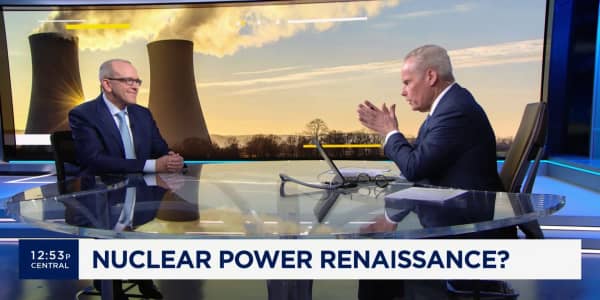With jobs numbers getting better, the European debt crisis seemingly on the back burner for now and a raft of other data points indicating improvement, it would be easy for Lakshman Achuthan to back off his controversial recession forecast from last year.
Not so, however — the economist from the Economic Cycle Research Institute proclaimed to CNBC that he remains convinced the U.S. is heading for a substantial downturn in the months ahead.
“Our call stands,” Achuthan said in an interview. “When you look at the hard data that is used to officially date business cycle recessions, it has been getting worse, not better, despite what the consensus view of an improving economy has been.”
When he predicted a recessionin a Sept. 30, 2011, CNBC appearance, it didn’t seem like Achuthan was making a very bold call.
Rising unemployment , fears of European debt contagion and a slumping stock market had just about everybody talking recession , with the only real dispute being how bad things would get.
However, global central banksshortly thereafter took control, and the direction started to change.
The Federal Reserve kicked off its “Operation Twist” bond-buying program, while the European Central Bank and Bank of England contributed aggressive monetary easing. While money-printing in the trillions has spurred inflation fears, it also has inflated prices of assets such as stocks and commodities.
Since then, the U.S. economic growth has been tepid — 2.8 percent in what was supposed to be an even better fourth quarter in 2011 — but steady. Unemployment has come down to 8.3 percent and even the housing numbers are picking up some.
But Achuthan insists that those trying to gauge the recovery are looking in the wrong places.
Annualized gross domestic product growth is slowing, he said, as is personal income, sales, and industrial production, all of which he sees amounting to a recession by mid-year.
“You put all this — you put it into a coincident index of the U.S. economy and if you look at year-over-year growth of that index, it’s now at a 21-month low,” Achuthan said. “You haven’t had a decline like that in the past 50 years without recession following in short order.”
But he and the ECRI have some substantial trends working against them.
Friday, for instance, brought more anti-recession data: The University of Michigan Consumer Confidence Surveyregistered a sterling 75.3, a mild increase over the previous month’s reading. This data point was one of the keys cited by, among others, Bank of America Merrill Lynch when it warned in August of a possible recession on the horizon when confidence was on the skids.
All recessions since at least 1978 have been preceded by sharp declines in the Michigan survey, and that’s simply not the case this time.
On the flip side, though, previous recessions haven’t had to account for a global debt crisisthe likes of which is happening in the euro zone periphery now. That, according to the team at Capital Economics, is the worst enemy now for the U.S.
“The recent improvement in the incoming economic data, particularly in relation to the labor market, has raised hopes that the US economy could shrug off the crisis in the euro-zone and finally enjoy a more vigorous self-sustaining recovery,” the London-based firm said in a recent analysis. “But the US economy has already been at this point twice before since the recession began, in early 2010 and then early 2011, only for growth to fall back sharply.”
Coupled with fallout from sovereign debt defaults, the tenuous nature of the recovery could be rattled easily.
“Domestic economic conditions appear to be on a firmer footing this time around, with signs of genuine improvement in housing and credit. Unfortunately, we expect the U.S. economy to be sideswiped by an even bigger external shock this year; with a high probability that Greece defaults and also exits the euro-zone,” Capital said. “In a worse case scenario, sovereign defaults in Europe and the break up of the single currency could cause a big enough ripple in the global financial system to trigger a renewed credit crunch in the U.S.”
Capital sees growth this year below 2 percent and only slightly higher in 2013, but is not forecasting a recession.
Goldman Sachs economists, though a bit more sanguine about the future, nonetheless see slow growth in the 2 percent range that also could be fragile.
"We emphasize there is considerable uncertainty around these estimates, and the path of potential output will depend in part on policymakers’ actions over the next few years," Goldman economist Andrew Tilton said.
But Achuthan said the path is fairly clear to a recession.
While the ECRI boasts a solid forecasting record over the past 20 years, the firm is not without its critics. Primarily, detractors say the ECRI uses undisclosed “black box” projections about which it is not forthcoming.
“This is not a black box. The coincident indicators — these are facts,” Achuthan said. “Those are the indicators used to define recessions. They're getting worse.”
Questions? Comments? Email us at
Follow Jeff @ twitter.com/JeffCoxCNBCcom
Follow NetNet on Twitter @ twitter.com/CNBCnetnet
Facebook us @ www.facebook.com/NetNetCNBC






